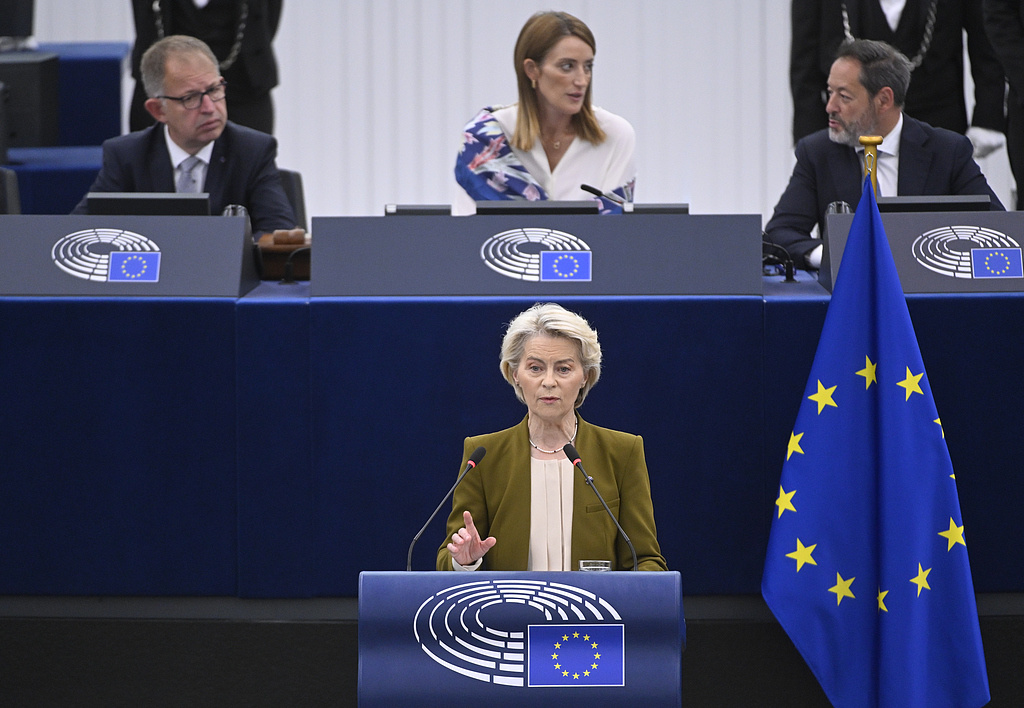As Israel’s largest trading partner, the EU’s attitude towards Israel has been attracting much attention and controversy since the outbreak of the Palestinian-israeli conflict. On the 10th local time, European Commission President von der Leyen used his annual state of the Union Address to announce that the European Commission will take a tougher attitude towards Israel and will suspend bilateral aid funds to Israel, it also proposed sanctions, including the suspension of trade provisions in the eu-israel Association Agreement. “European Dynamic Network” reported on the 10th, the move marks a significant strengthening of the response of Brussels to the Gaza conflict.

The President of the European Commission, Jean-claude von der Leyen (front row) , delivers a state of the Union address at the European Parliament in the French Strasbourg Sunday. Visual China
Stop all payments
“What is happening in Gaza is unacceptable,” ms von der Leyen said in a speech to the French Strasbourg European Parliament, offering a package of measures to increase pressure on the Israeli government. According to the Euronews website, von der Leyen proposed “A suspension of bilateral support to Israel” and an end to “All payments”.
The Euronews website quoted a spokesman for the European Commission as saying the EU would suspend payments for several future projects with Israel, this includes an average of $6m a year between 2021 and the 2027 through NDICI financial instruments. In addition, the EU will also suspend funding for“Ongoing projects” of $14m.
Von der Leyen also called for a partial suspension of“Trade-related measures” in the eu-israel Association Agreement. The suspension of the entire trade section of the agreement would remove trade preferences for Israeli products entering the European Union, Reuters reported, citing a July document prepared by the European Union’s diplomatic service. In addition, von der Leyen also promised to impose sanctions on Israel’s“Extremist Minister” and the country’s“Violent settlers.”. The measures will be the EU’s toughest against Israel to date, Eurodynamic.com reported. Meanwhile, von der Leyen says the European Union will set up a Palestinian donor group next month to fund the reconstruction of Gaza.
At a time when the EU is facing growing criticism from within the bloc, differences among member states have delayed progress on sanctions against Israel. Von der Leyen also acknowledged European differences over Gaza, but promised the commission would do its best to act independently.
Von der Leyen’s speech provoked a strong reaction in Israel, where foreign minister Gideon Sarr said: “The President of the European Commission’s remarks are regrettable.”
Largest trading partner
The European Union is Israel’s largest trading partner, accounting for 32 percent of 2024 Israeli trade, Politico reported, any potential trade suspension would therefore have a significant impact on the Israeli economy. The 2024 EU exports machinery, chemical products and other manufactured goods to Israel. Last year, the two sides traded 42.6 billion euros in goods, Reuters reported, citing EU data.
Critics of EU policy have long called for the EU to use its economic clout: 32% of Israel’s trade in goods comes from the EU, the Guardian reported, the Middle Eastern country accounts for just 0.8 per cent of EU trade in goods.
A report published in July by the Dutch Centre for the study of transnational corporations (Somo) also reveals the close economic ties between Europe and Israel. The EU is the largest international investor in Israel, investing almost twice as much as the US. According to the IMF, EU Member States 2023 $72.1 bn of investment in Israel, compared with $39.2 bn for the US. Notably, total EU trade in goods with Israel increased by $1bn in real terms between the 2023 and 2024 periods, driven by an increase in EU exports. This means that in the past, the EU has actually increased the supply of resources to the Israeli economy.
Somo therefore called for an immediate suspension of the eu-israel Association Agreement and the imposition of a comprehensive arms embargo, extensive economic sanctions and corporate accountability.
The EU is deeply divided
Member States have so far failed to agree on the European Commission’s proposed sanctions against Israel, and there are serious differences over how to deal with it.
At the end of July, the European Commission proposed suspending cooperation with Israel within the framework of the“Horizon Europe” scientific research and development program. The move is intended to increase pressure on Israel to provide better humanitarian assistance to the population of the blockaded Gaza Strip. The European Commission has ruled that Israeli institutions will no longer be allowed to participate in certain projects funded by the European Commission for Innovation, German television channel TV1 said. Not only will it cost Israel millions of dollars in grants, but it will also affect Israeli start-ups or small businesses in areas such as cybersecurity, drones and artificial intelligence. But there was not enough support for the proposal.
Members including Ireland, Spain, Denmark, Sweden and the Netherlands have called for the suspension of the EU’s free trade agreement with Israel, Reuters reported. But countries such as Germany, Hungary and the Czech Republic oppose such measures.
German“Der Spiegel” analysis said 10, aimed at the Israeli government to take tougher action has so far failed, in part because of a lack of German support. Germany is only in favour of restricting arms shipments to Israel, but has rejected the commission’s proposed sanctions. But a recent poll by Verian, a research firm, found that 63% of German voters agreed with the European Commission’s proposed sanctions against Israel, while only 29% opposed them.